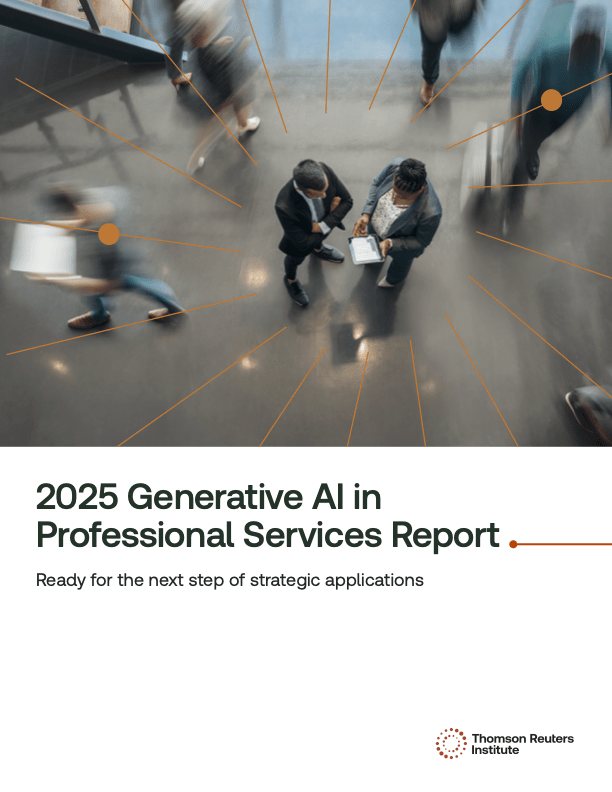As we approach 2025, the legal industry stands on the brink of a significant transformation driven by generative AI. The Thomson Reuters Institute report “2024 Generative AI in Professional Services” provides a detailed analysis of how this technology is expected to reshape legal services. This blog explores the report’s key findings, focusing on broad trends and contrasting the perspectives of law firms and corporate legal departments.
Jump to ↓
| Overview of generative AI in legal services |
| Key trends in generative AI adoption |
| Differing perspectives: Law firms vs. corporate legal departments |
| Challenges and ethical considerations |
| Strategic recommendations for legal professionals |
| Embracing the future: Strategic integration of generative AI in legal practices |

AI news and insights
Industry-leading insights, updates, and all things AI @ Thomson Reuters
Join community ↗Overview of generative AI in legal services
Generative AI refers to advanced machine learning models capable of producing human-like text, generating insights, and automating complex tasks. In the legal sector, this technology promises to revolutionize various aspects of practice, from research and drafting to client interactions and operational efficiency.
Key trends in generative AI adoption
Legal Research and Analysis
Generative AI is set to enhance legal research by providing faster and more accurate results. AI-powered tools can analyze vast amounts of legal data, case law, and statutes, offering insights that would take human researchers significantly longer to uncover. This capability allows legal professionals to focus on higher-value tasks, such as strategic planning and client advising.
Document Drafting and Review
AI-driven tools are already making strides in automating document drafting and review processes. These tools can generate initial drafts of contracts, pleadings, and other legal documents, significantly reducing the time and effort required. Additionally, AI can assist in reviewing documents for errors, inconsistencies, and compliance issues, ensuring higher accuracy and efficiency.
Client Interaction and Communication
Generative AI can enhance client interactions by providing instant responses to common queries and generating detailed reports and updates. AI-powered chatbots and GenAI assistants can handle routine inquiries, freeing up legal professionals to focus on more complex and strategic work. This technology also allows for more personalized and timely communication, improving client satisfaction.
Operational Efficiency and Cost Management
AI’s ability to automate repetitive tasks and streamline workflows can lead to significant cost savings and operational efficiencies. Law firms and legal departments can allocate resources more effectively, reduce overhead costs, and improve overall productivity. This efficiency is particularly crucial in an increasingly competitive legal market.
Differing perspectives: Law firms vs. corporate legal departments
While both law firms and corporate legal departments recognize the potential of generative AI, their outlooks and plans for adoption vary.
Law Firms’ Outlook and Plans
Law firms are generally more cautious in their approach to AI adoption. Concerns about data security, ethical implications, and the potential impact on billable hours contribute to this cautious stance. However, forward-thinking firms are beginning to invest in AI to stay competitive and meet client demands for more efficient and cost-effective services. These firms are exploring AI’s potential in areas such as legal research, document automation, and client communication.
Corporate Legal Departments’ Outlook and Plans
Corporate legal departments are often more proactive in adopting AI technologies. Driven by the need to manage costs and improve efficiency, these departments are leveraging AI to streamline operations and reduce reliance on external counsel. AI tools are being used to automate contract management, compliance monitoring, and legal analytics, enabling in-house teams to handle more work internally and make data-driven decisions.
Challenges and ethical considerations
Despite the potential benefits, the adoption of generative AI in legal services comes with challenges and ethical considerations. Data privacy and security are paramount concerns, given the sensitive nature of legal information. Ensuring that AI systems are transparent, unbiased, and compliant with legal standards is also critical. Legal professionals must navigate these challenges while maintaining the integrity and trust that clients expect.
Strategic recommendations for legal professionals
To successfully integrate generative AI into their practices, legal professionals should consider the following strategies:
- Invest in Training and Education: Equip your team with the necessary skills to understand and leverage AI technologies effectively.
- Take part in CLE training for legal research and practice management products
- Using AI for cite checking
- Enhance litigation strategy
- Reimagine legal drafting with GenAI
- Learn how to create prompts using GenAI
- Start Small: Begin with pilot projects to test AI tools and assess their impact before scaling up.
- Collaborate with Tech Experts: Partner with technology providers and experts to ensure the successful implementation and management of AI systems.
- Focus on Ethical AI: Develop and adhere to ethical guidelines for AI use to maintain client trust and comply with legal standards.
- Continuously Evaluate and Adapt: Regularly assess the performance of AI tools and make adjustments as needed to optimize their benefits
Embracing the future: Strategic integration of generative AI in legal practices
The Thomson Reuters Institute report highlights the transformative potential of generative AI in the legal industry. By understanding the key trends, differing perspectives, and strategic considerations, legal professionals can navigate this technological shift effectively. Embracing generative AI offers the opportunity to enhance efficiency, improve client service, and stay competitive in a rapidly evolving legal landscape. As we move into 2024, the integration of AI will undoubtedly become a defining factor in the success of legal practices across the industry.















